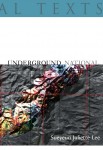Underground National by Sueyeun Juliette Lee | Factory School 2010 | $15

Sueyeun Juliette Lee titles the first section of Underground National with an answer that inverts, re-contextualizes and re-defines the Double Jeopardy question: “Korea, What is.” Each page flips like one of Alex Trebek’s blue television screens, revealing answers in the form of satellite images, sound bytes and “ShareThis RSS.” “An impossibility” for 200 may be Lee’s first category and line, but the multiple stains, burials and explosions that gather resonance and color locate a nation—a nationalism—in jeopardy.
But what the nation speaks, we are required to understand.
And that speaking ties us to this sinking ground.
And it isn’t stone at all, but made of blood.Just as I am, just as you are (53).
Lee re-programs a variety of source materials throughout this book, from the Pledge of Allegiance and Korean-English dictionary entries to blog posts and screenshots to NASA satellite images and the CIA. One page lists two sets of data in square kilometers (total, land and water), subtly implying disparate values for North and South. Another page has a small legend noting symbols for chemical production sites, biological weapons sites and uranium enrichment sites that reference an absent map—itself a legend. The topographical image on the front cover and the series of satellite images of Korea suggest that from this distance it might be possible to see the country without a line through it. The broken promise of “indivisible” and “under god” looms, becoming “a nomenclature of division” (17) and “under ground.”
Lee then juxtaposes buying souvenirs at the DMZ with K-pop celebrity suicide; sex tourists at juicy bars with statistics on mental health. These single page “singles” of academic quotes and speculative internet reports release themselves like a myriad of anthems being sung at the same time—different words, same tune. Lee cites a Korean Central News Agency report of an underground nuclear explosion that occurred near P’unggye on October 9, 2006. This uprising, “a tectonic pulse, another way to imagine a breach, or what else stands against the DMZ” (77) rumbles with audible and inaudible echoes in the book—speculation about what is buried, and what is buried—”to bury a thing but not kill it” (52). A voice in the book says, “‘Looking back, I think my body was not mine, but the government’s and the U.S. military’s'” (33), speaking to the split body/split country schisms that are a product of colonization and war, held in the air by a twine called “liberation.”
<Of or relating to a ‘nation’; common to or characteristic of a whole nation>
And what is enough distance to see.
Outside of a nation being _____, _____, and _____.
Yes or no.
The subtleties of your be(long)ing as the outline of metaphor.
Filled with shapes such asblue herons
used artillery cartridges
a loaf of white bread
recurring dreams of lightning (57) *
Between and among these gestures, Lee periodically returns to an image of a kite. Its symbolic suspension and tension brings us out of the earth and into the sky, connects underground and outer space, links source text to memory and manifests in the body of the one who flies it: “Kite: between two impossible states. A tug and pull enforced by sky’s restless dreaming, contrary wakefulness of earth, nerve-like. Flicker feeling in the flesh, cast free but held” (19). Resonances with Myung Mi Kim’s Commons and Theresa Hak Kyung Cha’s Dictee float up out of the rubble of this text, touching upon a Korean American feminist relationship to national longing and national strife. Lee writes the kite as the texture of a body going “there”/”home,” which gains distance and perspective in spite of the vulnerability of its fabric. It is, in the same moment, buffeted and tethered, in fetters, and yet also in danger of “fall[ing] from out of the sky” without warning (90).
In the remarkable section, “THE BENEFIT OF HAVING A HUMAN BODY,” the tone shifts to prose and part mythic dreamscape. Here, Lee focuses on the body’s experience of nation-building and nation-collapse. Lines like “Grant him a visa, he who eats with a spoon, document a tattered list of names” (17), “I help by explaining a Medicaid letter to her” (87) and “Should I emigrate if the opportunity arises” (90) point to stories of immigration and other arrivals as they play out in intergenerational relationships. Lee writes the body arrested in transit between several nations and ideas of nations: “I see that there are mirrors that stand between us and the lands we claim as home” (92) and “I hallucinate this landscape, and am myself a mirage” (93). The body “emerges and drops,” looking for a place to land, looking for a place to hide.
And inevitably, regardless arrival, regardless the many small and difficult decisions, compromises, and sacrifices that lead a body or its spirit there, it is never what it seemed to be. That quality of air you brace yourself for, that headlong into another ocean’s wrap, a new sound’s spray, out of it you emerge and drop. How does it dissolve, shutting past? The seams that hold things together also keep them at bay, just like the body is a barrier and embrace. I mention these things to you very softly, and only when I think you are asleep. And the expression of them, is that so meaningful, and what (95).
* Formatting for some of these quotes appears differently due to blog constraints.
One thought on “Review: Sueyeun Juliette Lee’s UNDERGROUND NATIONAL”